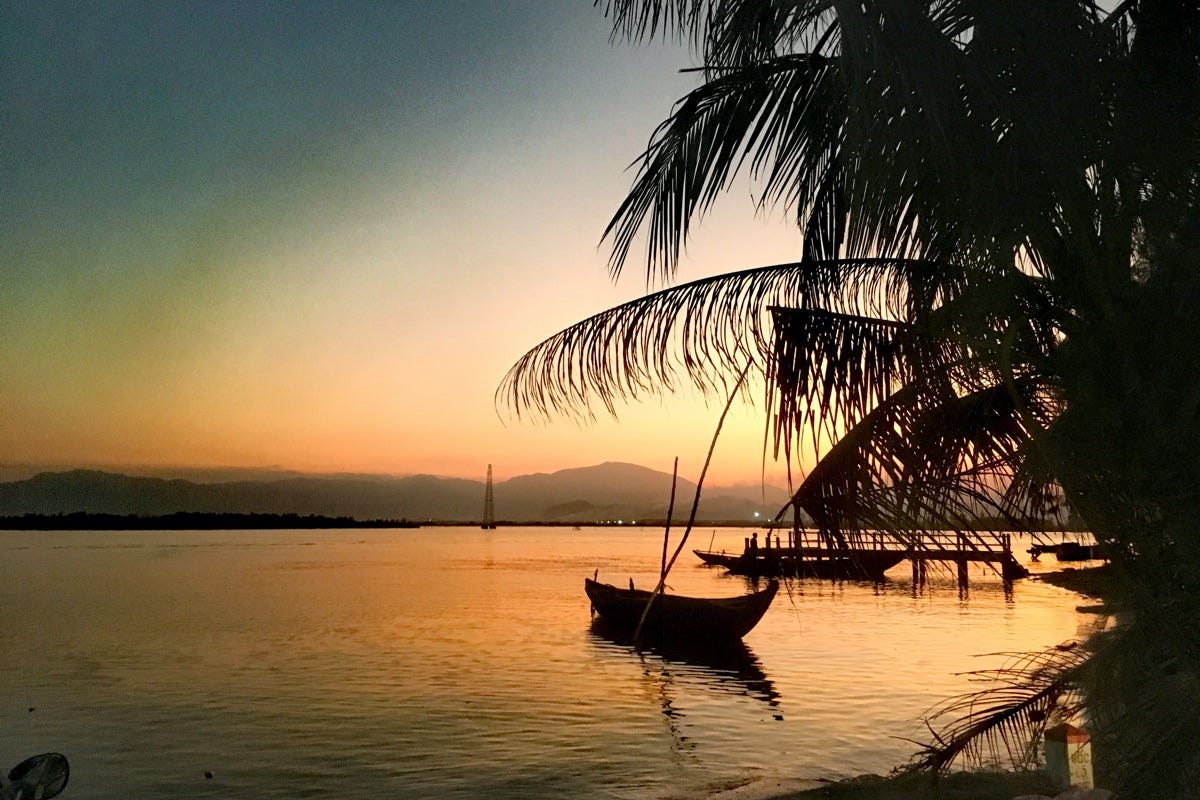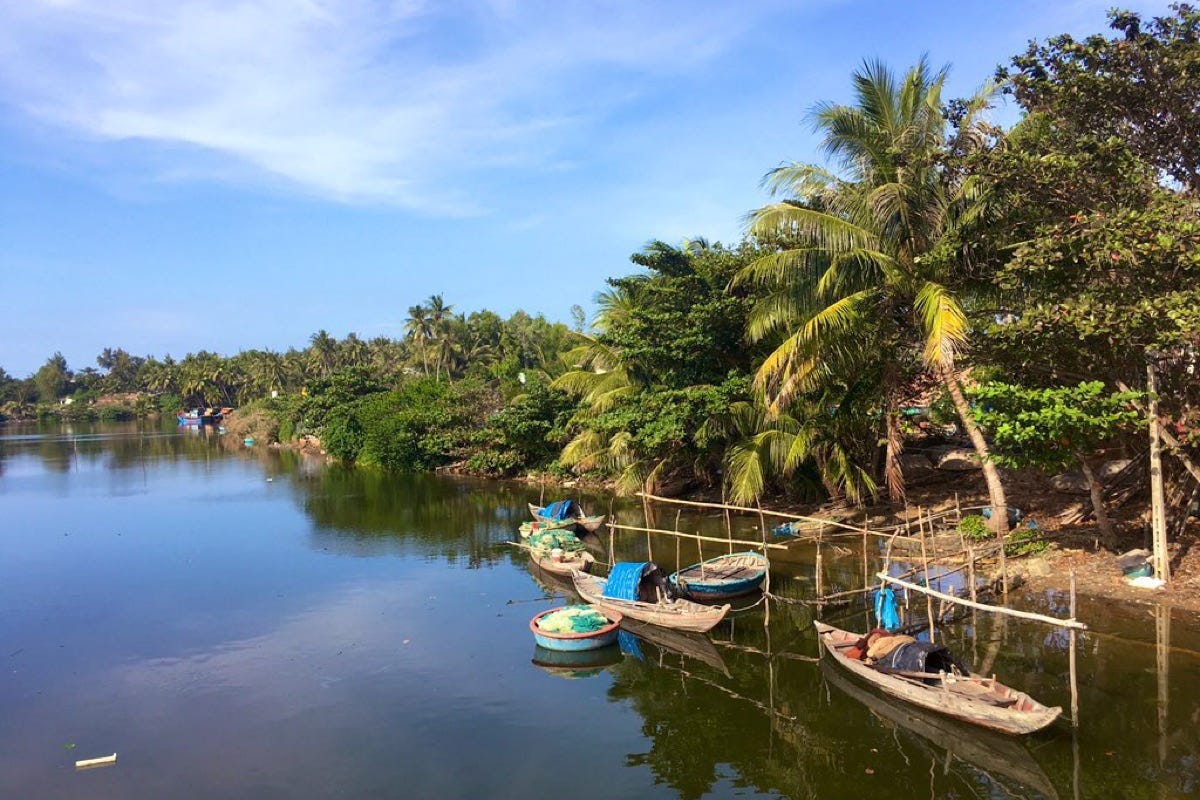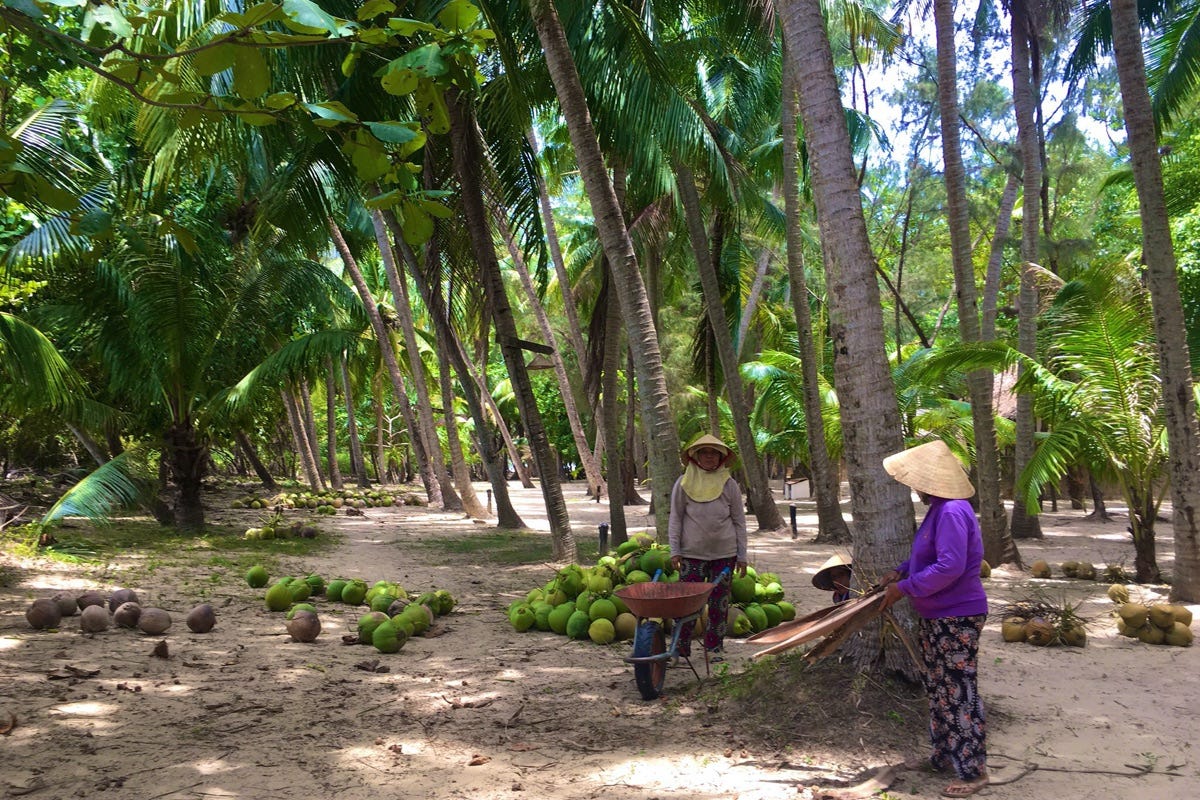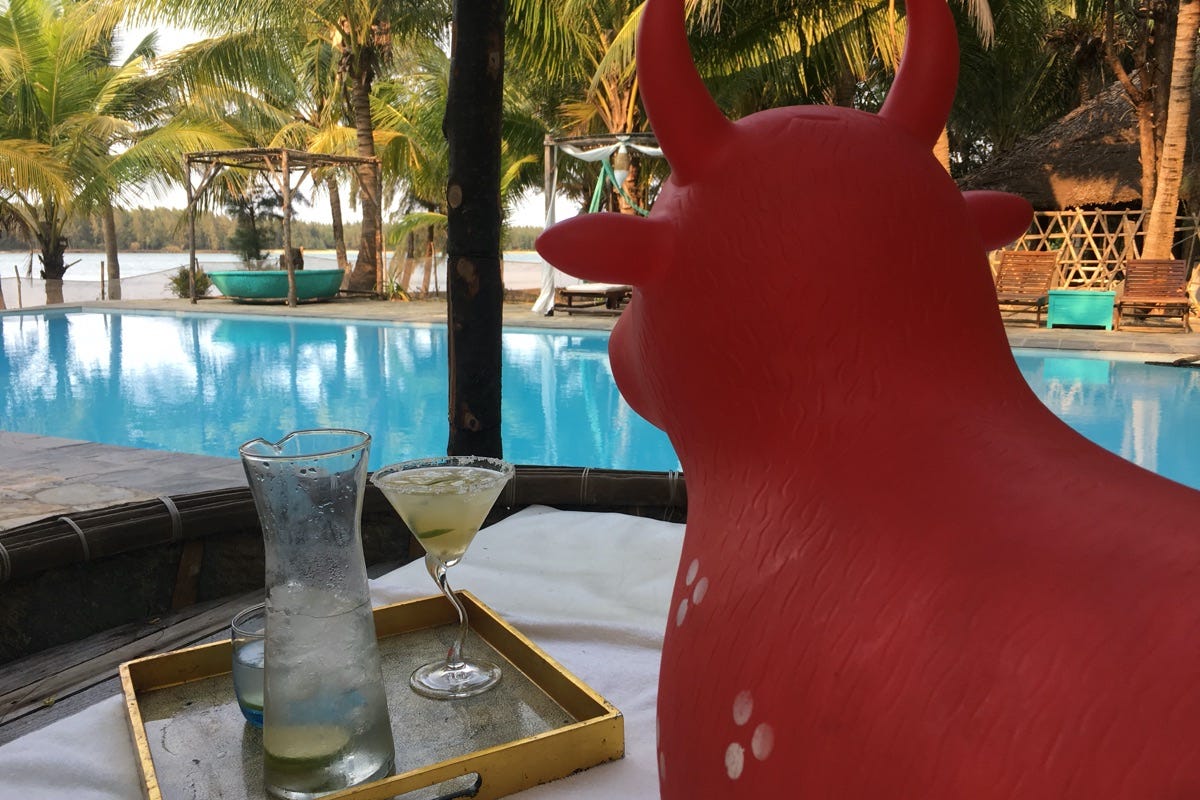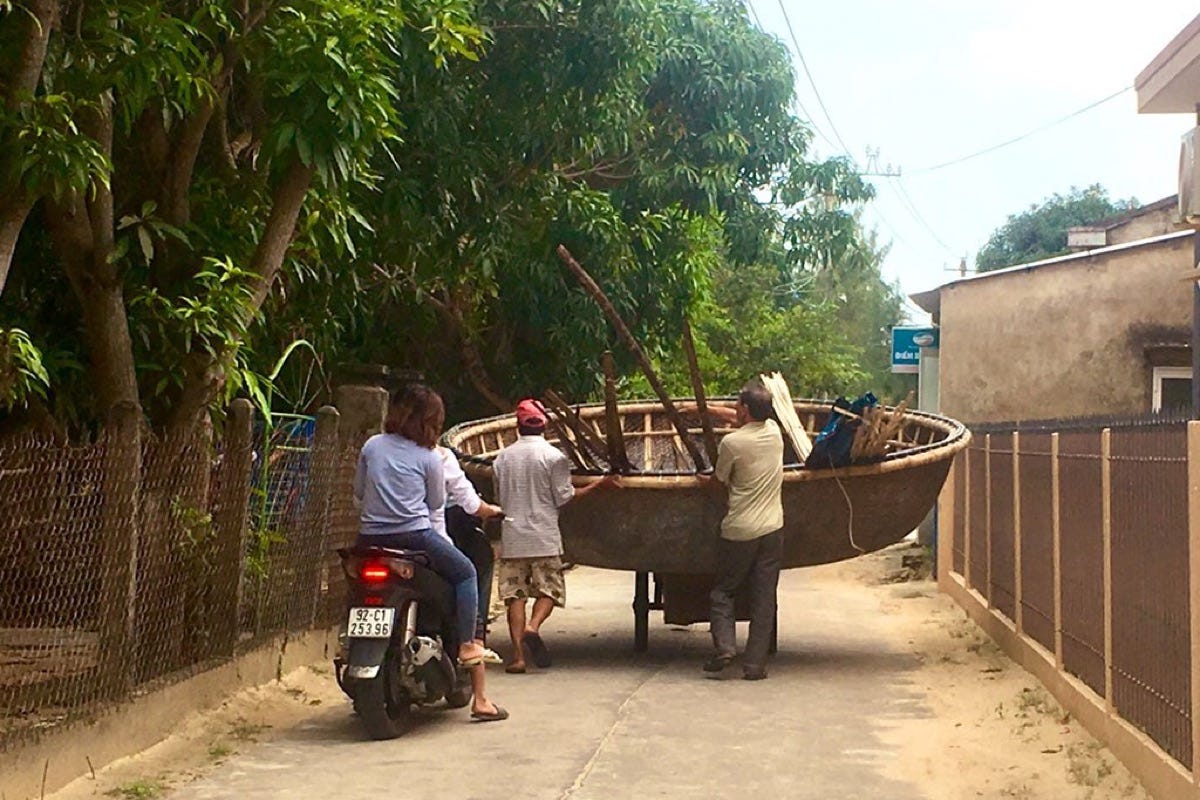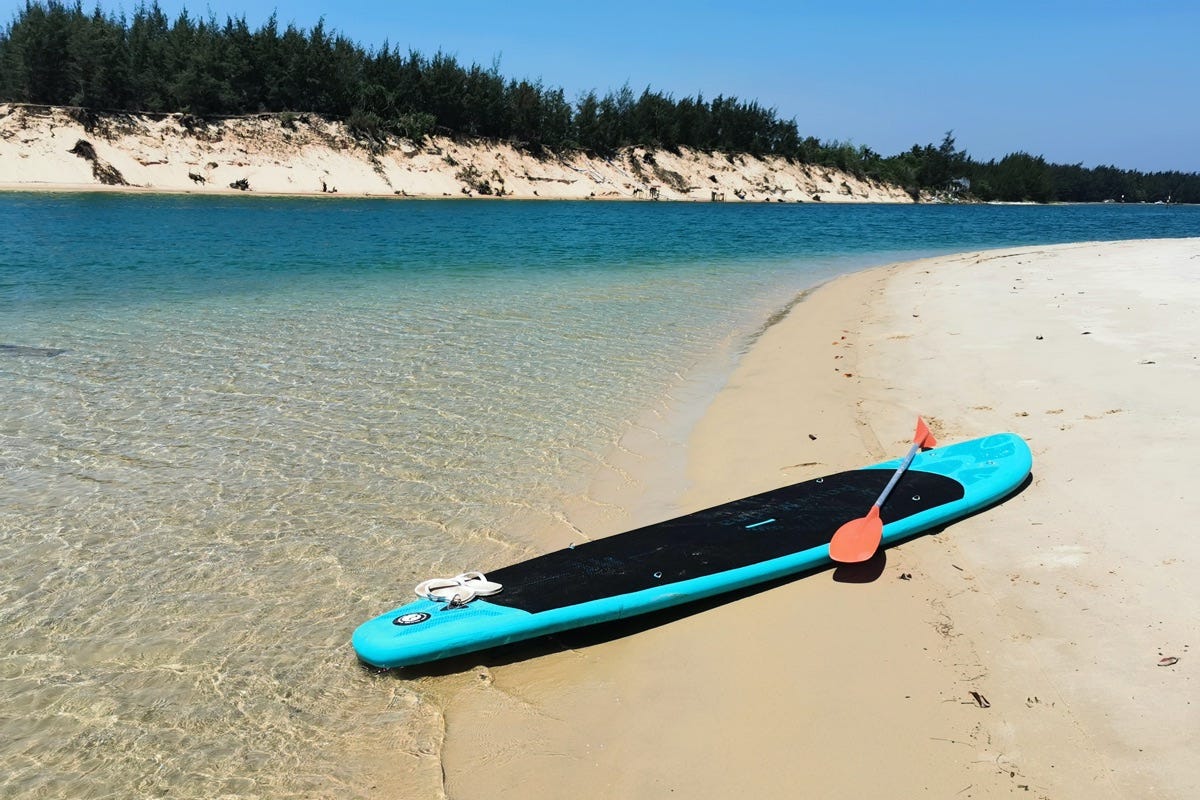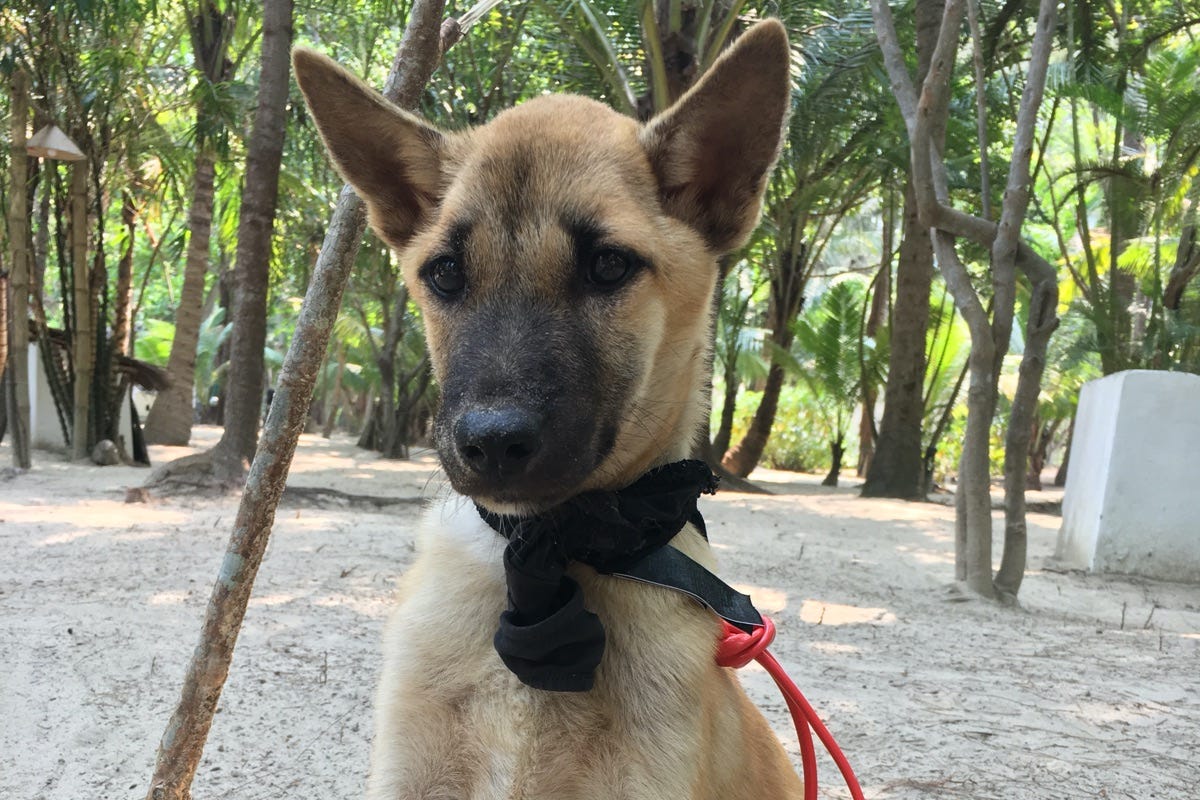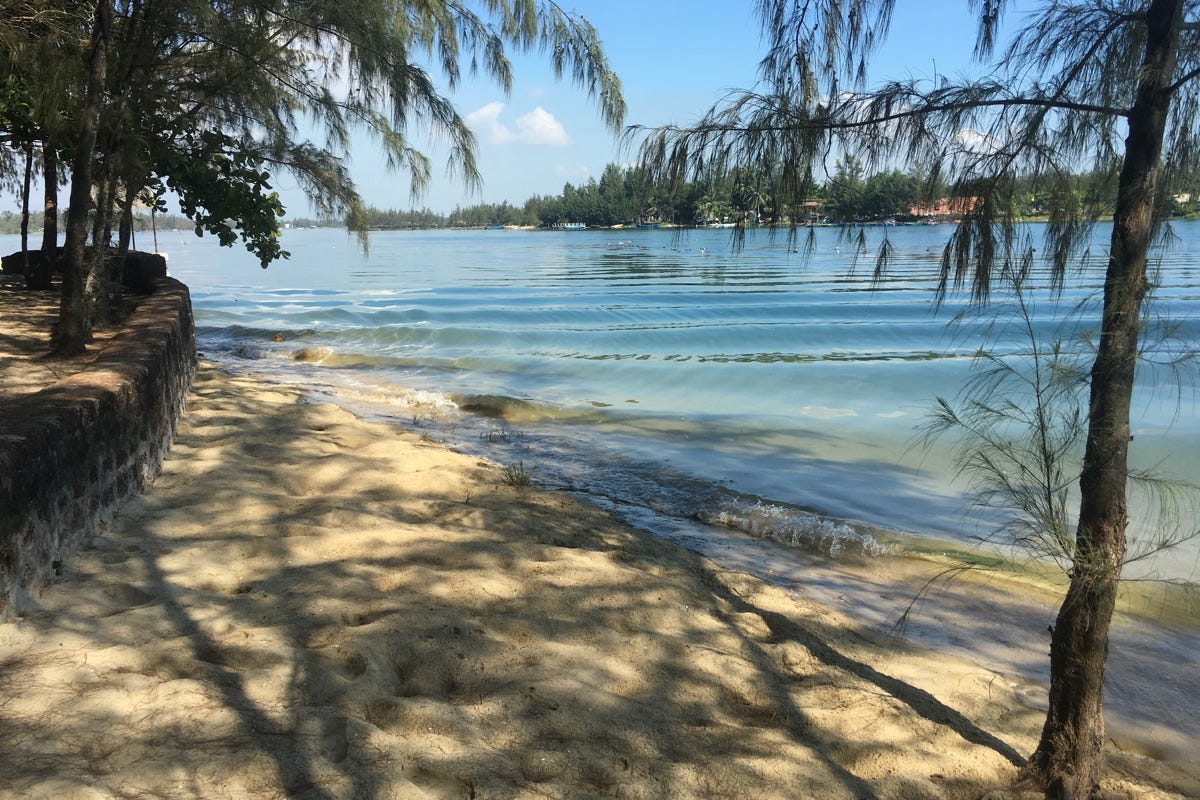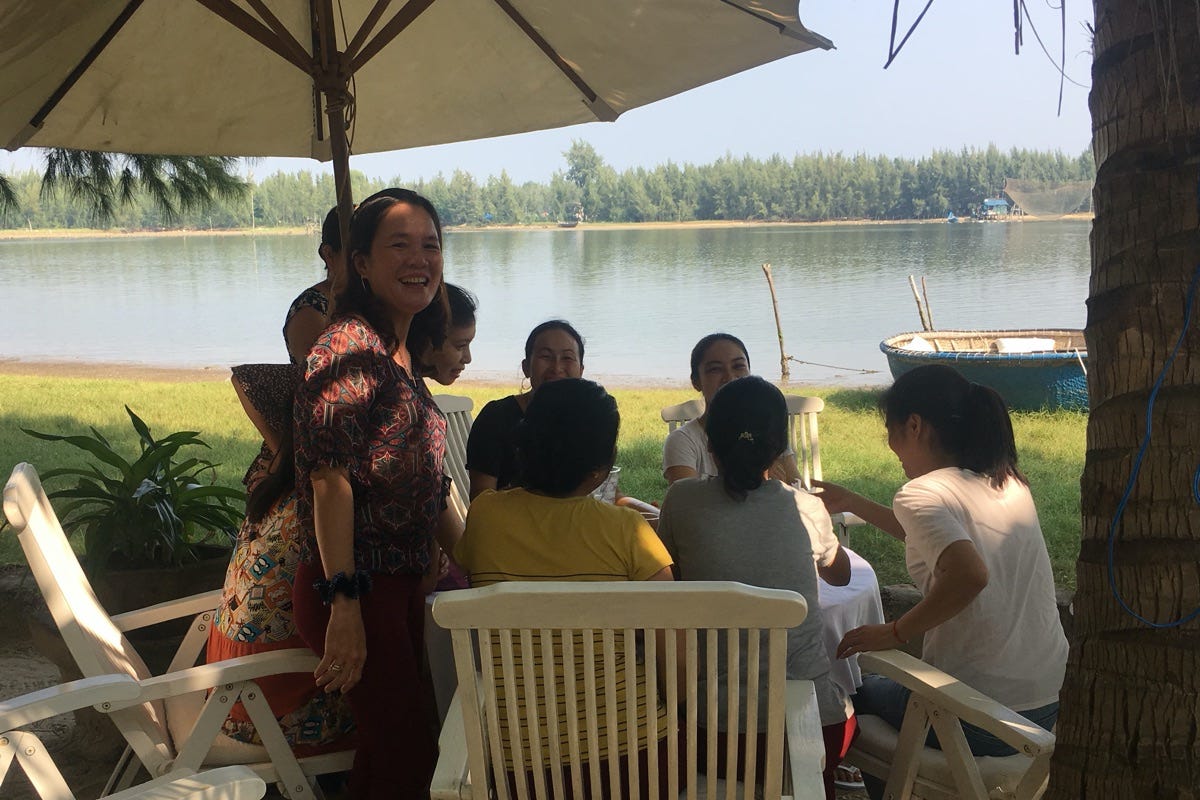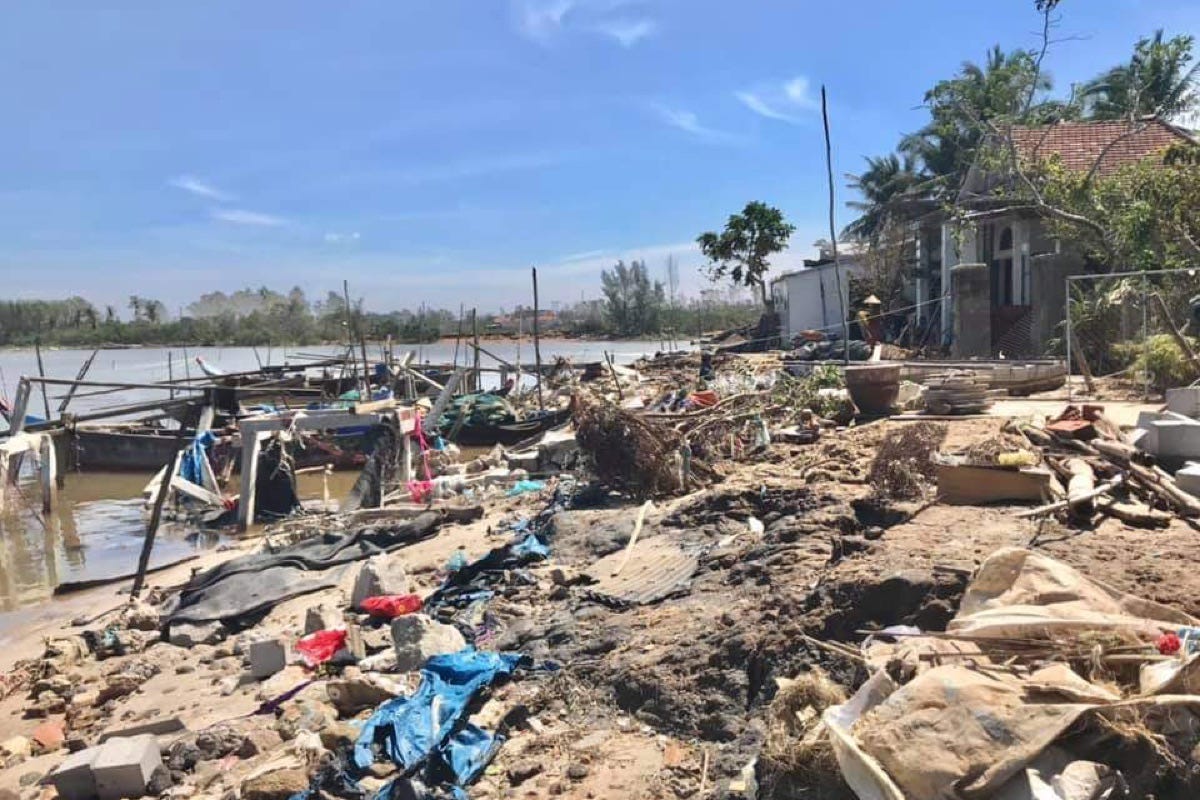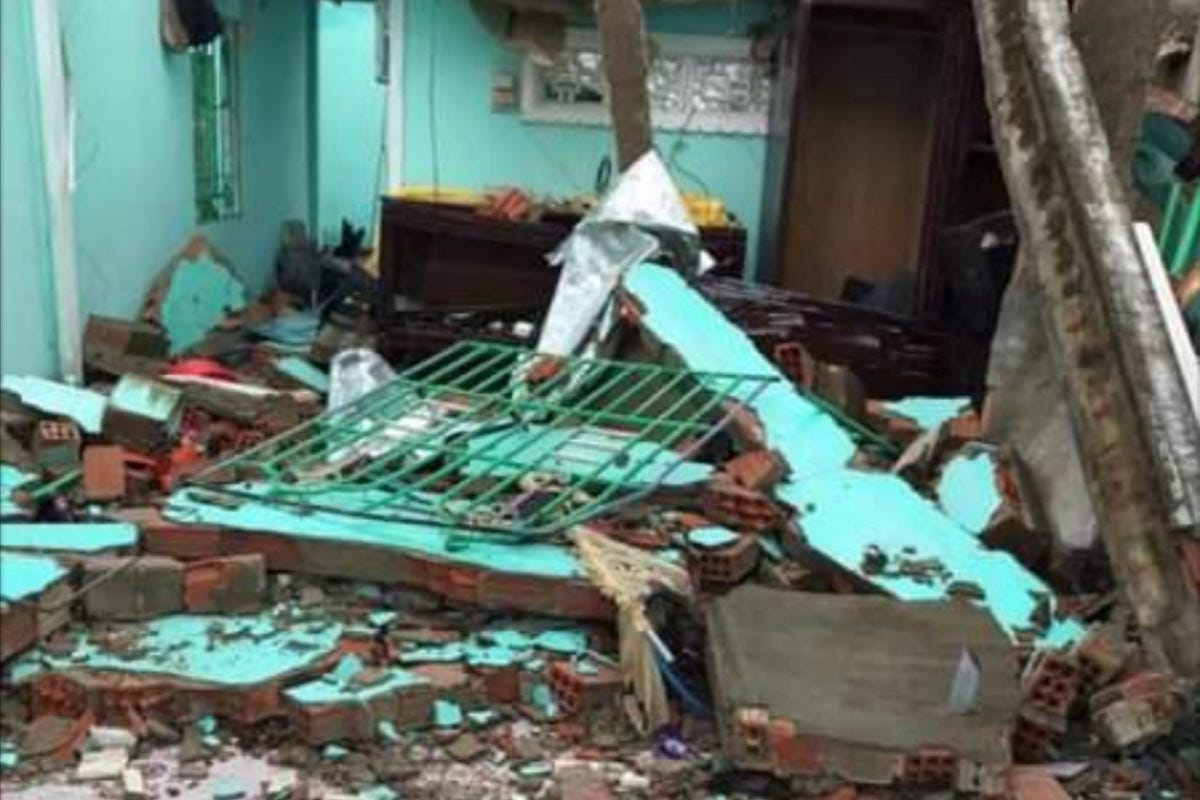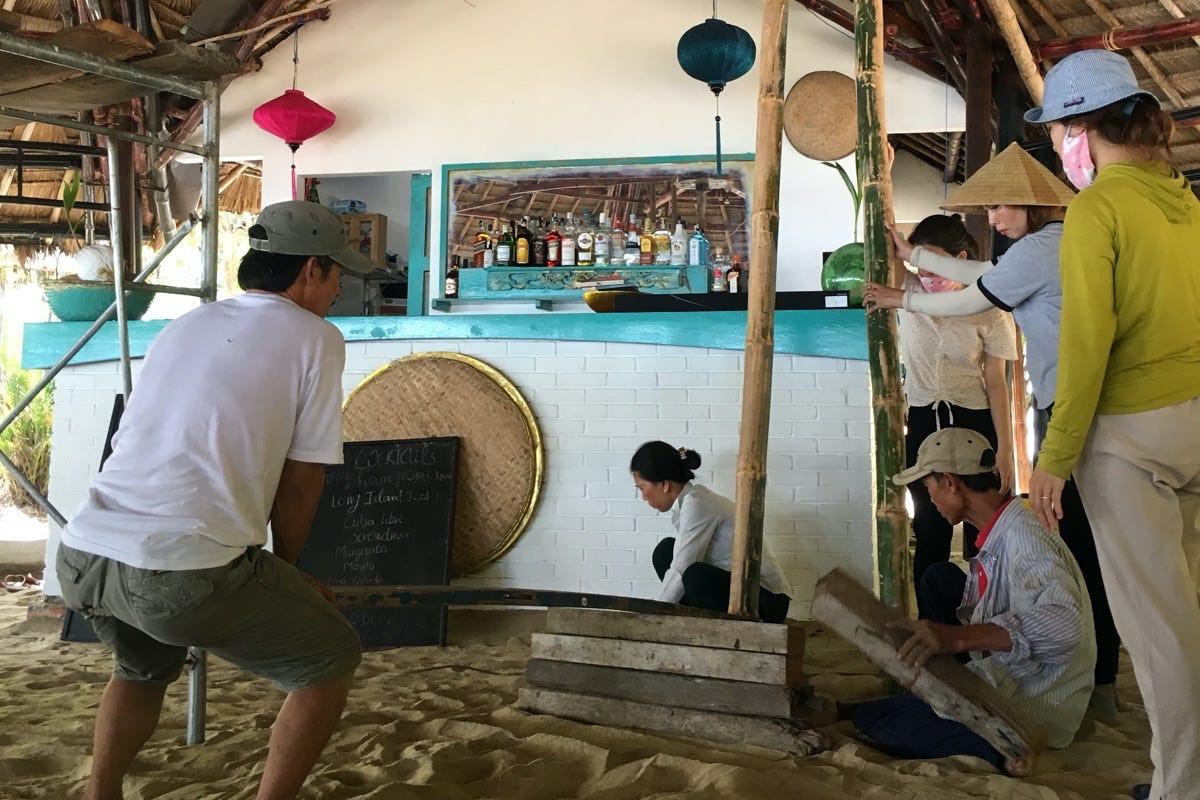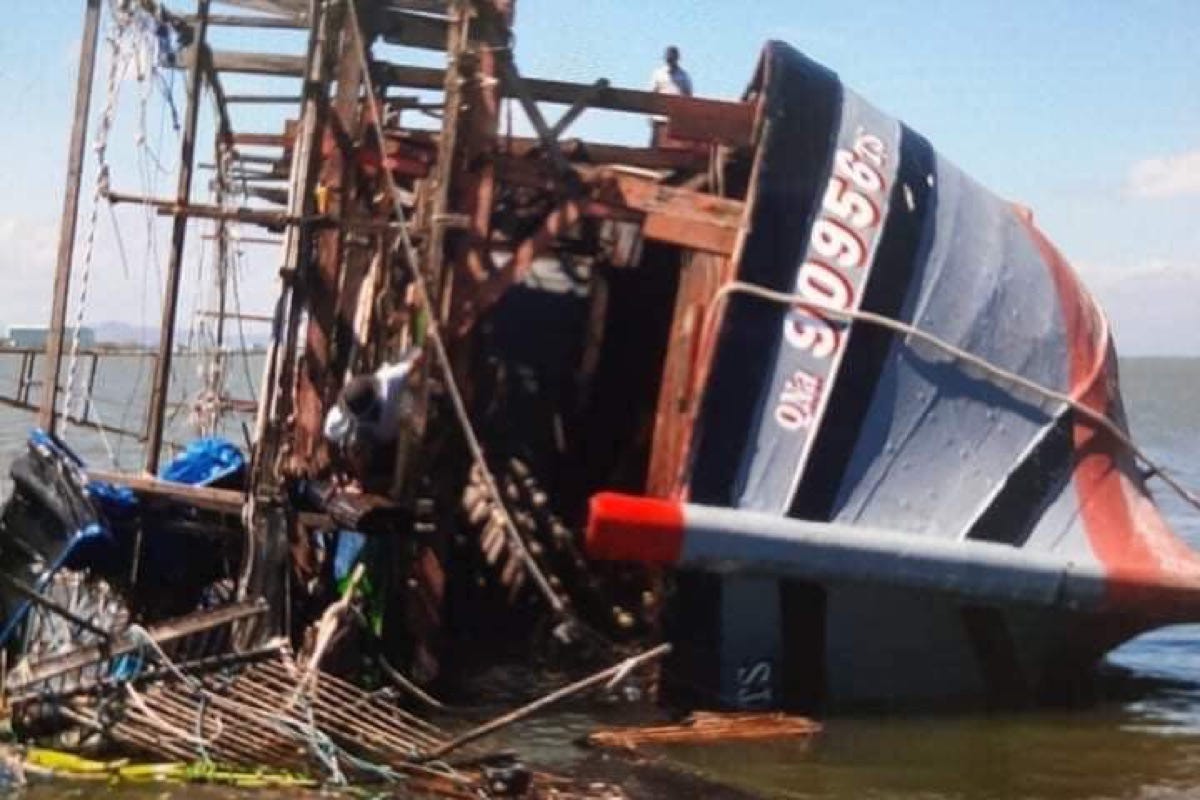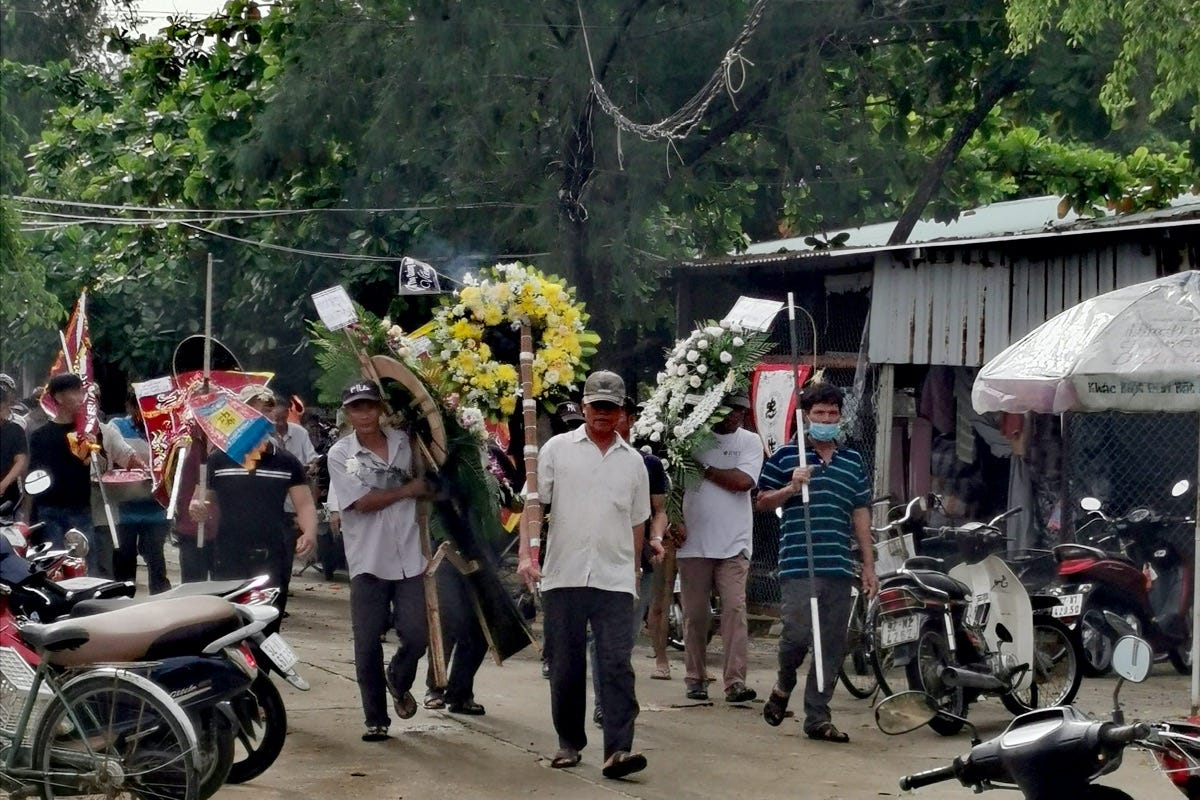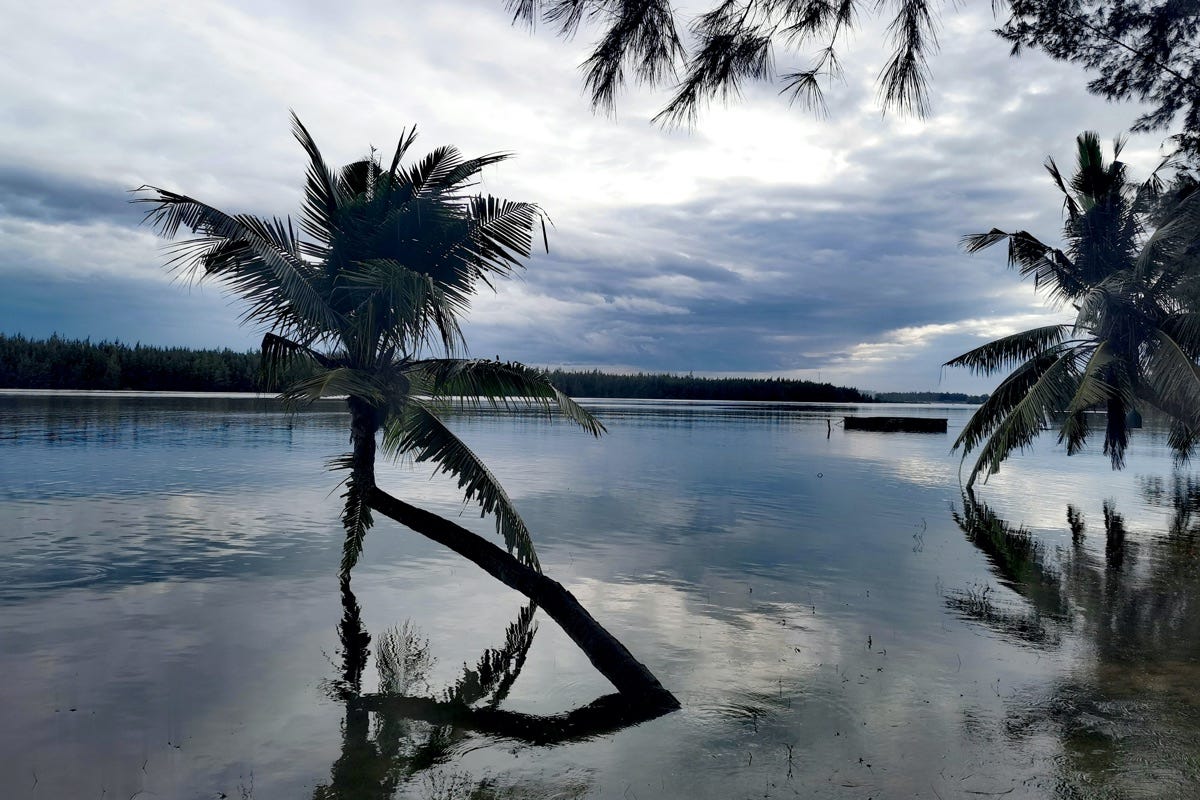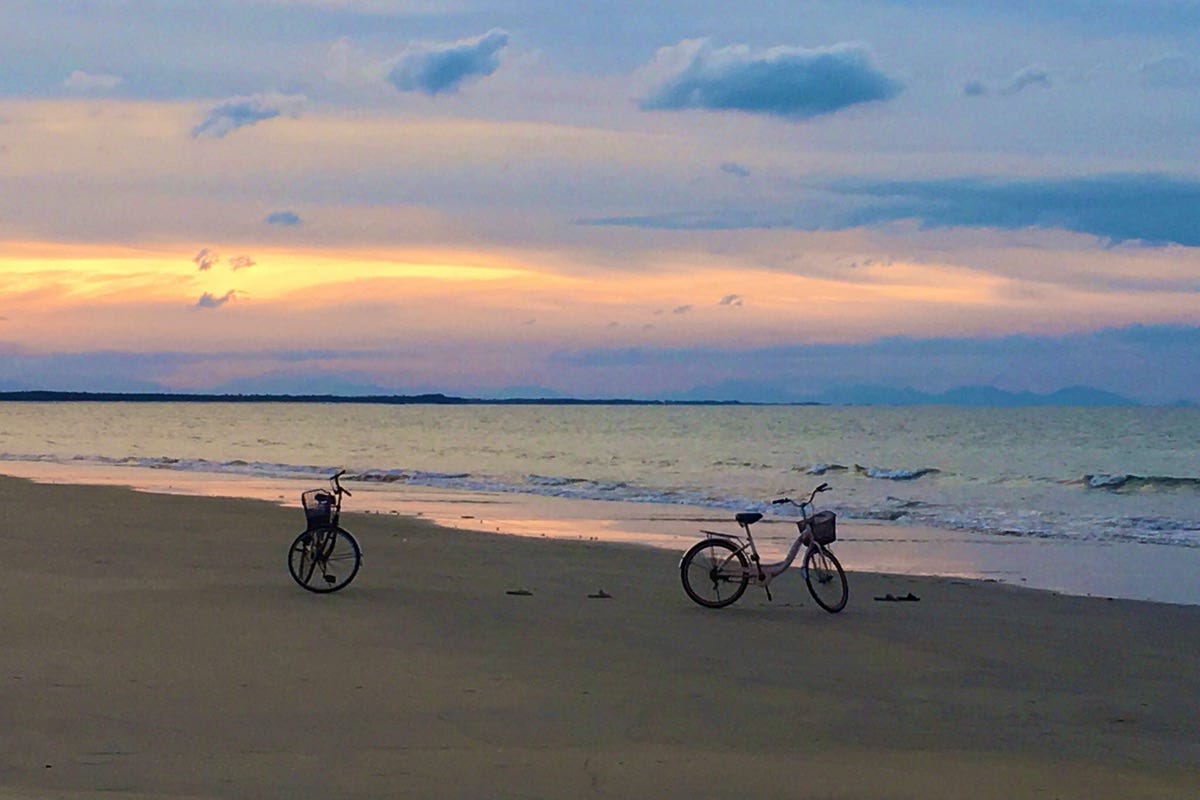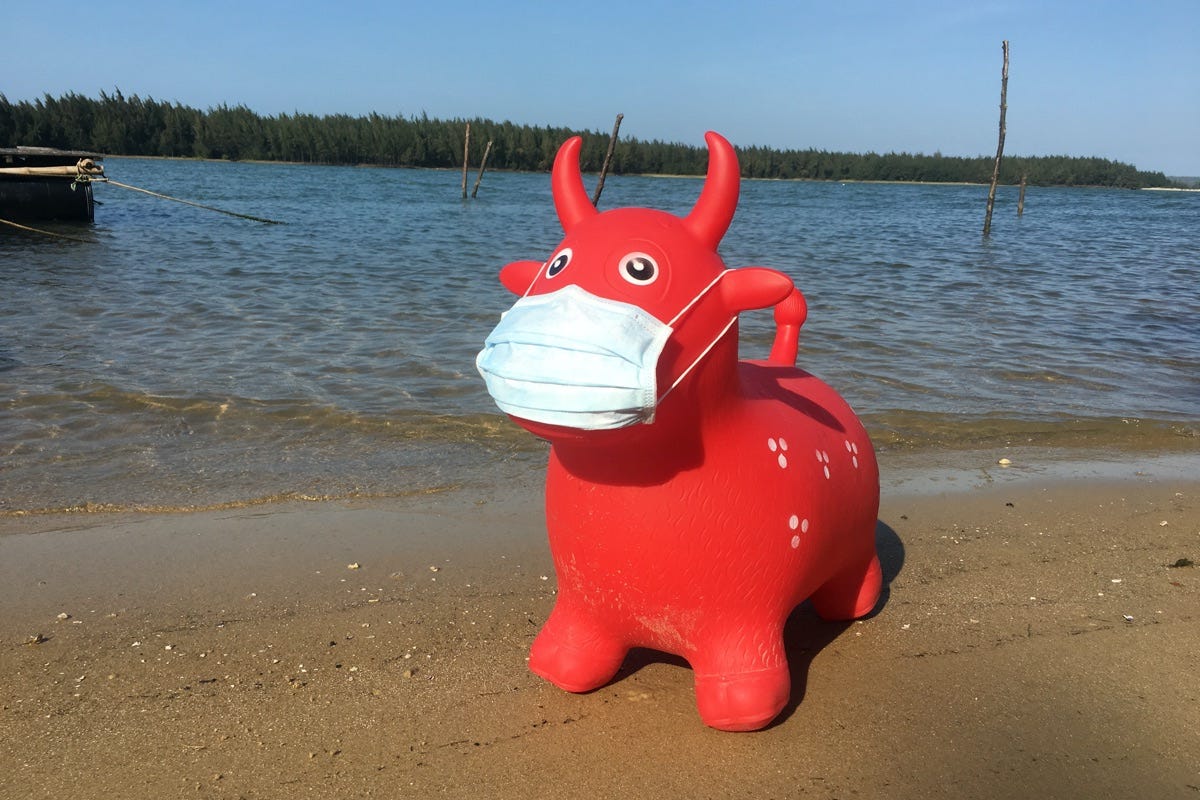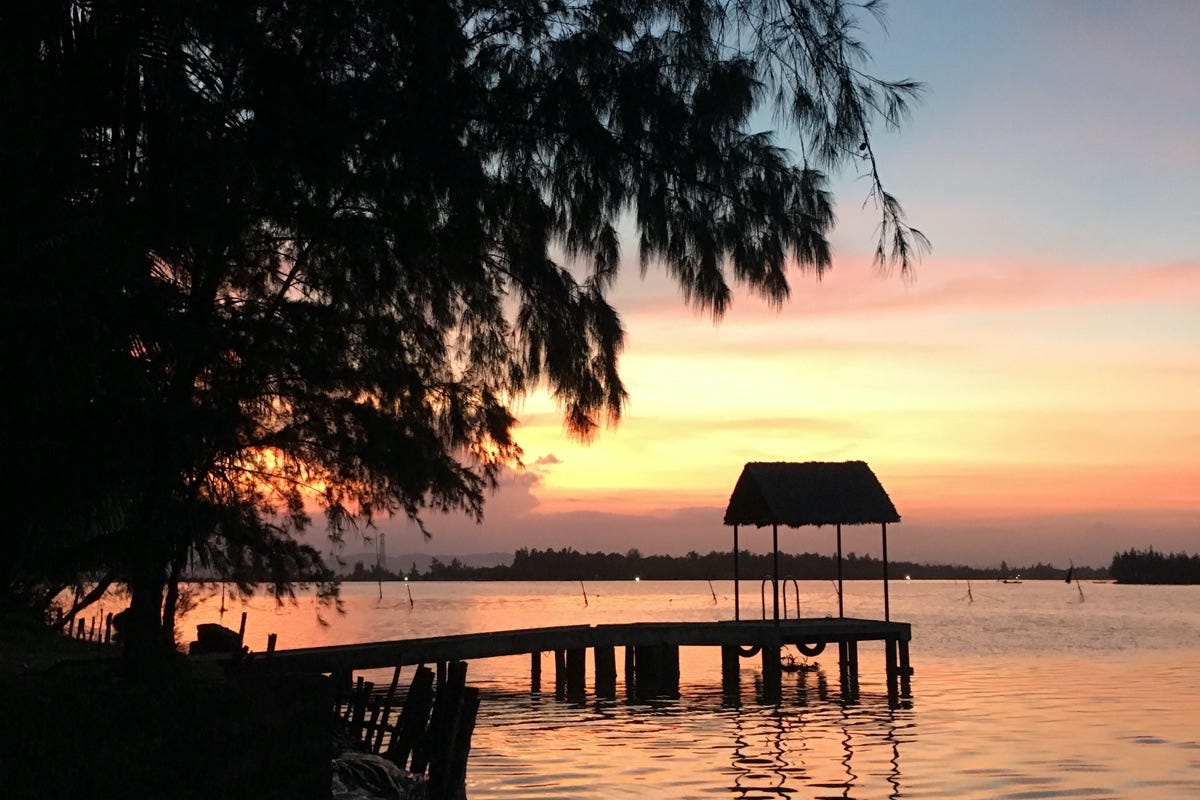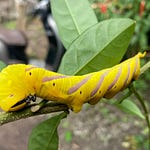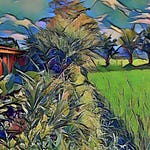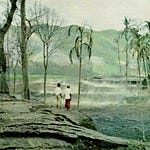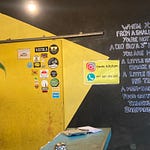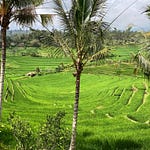This week I have an interview with my friend Caroline Mills. She’s an ex–Travelfish writer and now runs a small resort an hour south of Hoi An in Vietnam.
You can reach Caroline on Twitter at @misscvietnam, by email at contact@ledomainetamhai.com or the resort’s Facebook page is https://www.facebook.com/LD.Tamhairesort/.
The transcript of the interview is below—with some minor editing for clarity and removing rooster noises.
Blood pressure drops. Photo: Caroline Mills.
Stuart
Hi everyone, today I’ve got an interesting interview with an old friend of mine and an ex–Travelfish writer Caroline Mills. She’s currently the manager of Le Domaine Tam Hai, a small resort on a small island, about an hour south of Hoi An. She’s been running the place for a few years and she runs it with a merry gang who she calls “The Pirates”. It’s been an interesting experience and I thought it would be an interesting chat to have, about what it’s like running a resort in Vietnam, that little bit off the track.
Caroline spoke to me by phone from the resort. She was busy with the Pirates getting them to put away, I think it was an angle grinder, and we’ve got some relative quiet. You’ll have to excuse the roosters—they’re actually at my place, not hers.
Without any further ado, let’s go straight into the chat with Caroline.
Slow days by the river. Photo: Caroline Mills.
Caroline thank you very much for your time to have a bit of a chat about what it’s like running a resort in Vietnam. Before we get onto the nuts and bolts of what it’s like doing what you do, can you give me a little bit of a brief history. What brought you to Vietnam in the first place and how it was that you ended up on an island south of Hoi An?
Caroline
Ah OK, Long story short, we quit the UK, my husband and I quit the UK because the recession hit back in around about 2009/2010. We were both in the luxury service industry back there and so we just sold everything and bought one way tickets to KL. The whole plan was to travel and wait until things got better.
Six months into that, we ended up in Hoi An. I may have lost our travel card and it took about, I don’t know, about 8 weeks before we got a new one. We kind of got a little bit stuck there. In that time we made loads of friends, got offered work and we just thought we’d hang around for a bit. Ten years later, we’re still here.
For the island side of it, I found as Hoi An developed it became very touristy. It also became really Western, and for me it didn’t suit my thinking of living somewhere exotic and far from home. I first visited the island about eight years ago and fell in love with the whole traditional lifestyle. It felt like Vietnam. So when I got offered this job, I jumped at it, and fell more in love with the island. So that’s why I’m still here.
Everyday scenes. Photo: Caroline Mills.
Stuart
So the resort was already there?
Caroline
Yes. The resort opened about 15 years ago, and back then there were no main roads or anything to the island. So even from Hoi An it would take about four hours to get here. Now there are bridges and highways and things, so it’s an hour away. But yeah, the resort has been here for a long time.
Stuart
So, can you tell me a little bit about the resort like how big it is, how many rooms there are, that kind of thing?
Caroline
The land is huge, but there are only ten villas on the land and so it’s mainly a natural place. It has lots and lots of trees which caused us some problems this year with all the storms. So it’s a small resort on a really large peninsula on the island. Even once you’ve come from the mainland, you still have to go over bridges to get to us, or otherwise come by the river.
Cows are welcome. Photo: Caroline Mills.
Stuart
Your staffing there, are they all drawn from the local community? Or are you bringing people down from Hoi An and other centres in Vietnam? How does how does that work?
Caroline
Only islanders. When the resort first opened, it was considered a poor area, so there’s no attraction for people from Hoi An to travel and come and work here. For me it’s really important to be able to give employment to the islanders. This comes with a lot of complexities because the education here ends at 14, and the predominant work is in fishing. It’s quite interesting trying to train staff, but they’re all hard workers and they’re all amazing. So yeah, we employ locally.
Stuart
How many employees do you have?
Caroline
We have 25 and most of them predate me—I’ve been here three years. Most of them have been working for the resort, or going backwards and forwards between here and having babies, or taking time off, since the resort opened.
Step outside and into Vietnam. Photo: Caroline Mills.
Stuart
I often see you on Twitter talking about the Pirates. I think sometimes it’s a bit of a term of affection and other times a term of frustration. Why do you call them Pirates?
Caroline
When I started at the resort, there were many, many problems from before. The owner, always employed a Westerner as manager, as back then 50% of our market was international travellers. As there’s no English language skills on the island, having a Westerner would be a positive thing. But she employed badly, and basically there was a lot of fraud.
The managers had taught the Pirates how to be a little bit naughty with finances. So initially I called them Pirates because they were all thieving little buggers. But it is a fond term. I mean for them it was just what they’ve been taught. So we had to go through quite a lot. But yeah, they’re amazing. I love our staff, but they did come from bad bad training.
Stuart
Do you feel that you’ve learned a lot from them?
Caroline
Yes, I’ve learned so much. I’ve learned to um, to relax and just believe that things can happen when we’re given a deadline. You know, even if it feels impossible, we do achieve it. And that works with the way that I work as well. I’m quite relaxed about stuff until we have only two days to get it done, and it’s the same for them. So yeah, I’ve learned an awful lot from them.
When Vietnam closed, numbers dropped off. Photo: Caroline Mills.
Stuart
So you mentioned that you’ve got over 20 staff and they’re all from the island, is that correct?
Caroline
Yeah.
Stuart
So would you say that you’re supporting a large number of families through having this enterprise?
Caroline
I hope so. The island is very, very old fashioned. When you support one family, or looking at a household of about three or four generations, so by employing one in that household, you’re supporting the entire family in a tiny way.
I’ve changed things so that we only buy our market shopping and things, we do that all on the island. And I’m trying to do this for every single purchase we make—although that’s difficult—is from the island. So the support goes beyond the staff.
Stuart
So you’re casting a larger shadow across the island in a way.
Caroline
Yeah, well I hope so, I’m trying.
One of the many stars on Caroline’s Twitter feed, Fat Dave. Photo: Caroline Mills.
Stuart
You mentioned earlier that you’re the manager, rather than the owner. If I remember correctly, the owner is in Ho Chi Minh City. Would you prefer to be the owner, or do you enjoy managing it rather than owning it?
Caroline
I’d love to own it! I know it is a financial impossibility, but there are so many restrictions, and the owner is a city woman. She loves the island and but she still doesn’t understand it. She handed it over to me and said run it as an owner, just throw things by me. But, there are quite a lot of arguments we have, because she doesn’t understand the island, so it’s really difficult. Certainly if I owned this place, I would run things quite differently.
Stuart
You said a primary market is international travellers, but with Covid, international tourism has changed. I realise the resort is closed for different reasons at the moment, but are you trying to change the approach and cater to more of a domestic market?
Caroline
Absolutely. Always 50% of our market was domestic travellers and I really enjoy that market. They’re easy, they’re great fun and also, it suits the Pirates. It’s not a struggle for them to try to understand the different ways that international travellers holiday, and easier for communication.
As a knock on effect, having a larger domestic market means I don’t have to work quite as hard, which is appealing. So losing the international market isn’t something that I’m concerned about. I’m really happy and quite excited to be aiming for the domestic market for the next year, or however long it takes for the rest of the world to catch up with Vietnam.
Pick a shady spot, turn the phone off for a week. Photo: Caroline Mills.
Stuart
If you had to pick one distinguishing factor that differentiates an international guest from a local guest, what would it be?
Caroline
Spend.
Stuart
Spend?
Caroline
Yeah. Most of our domestic travellers are return or word of mouth guests. They know what they’re signing up for before they come here—and they’re really excited. They’ll come from the cities, and as our price point is four–star, so they know from that it’s not going to be the cheapest holiday they could have. They’re excited about experiencing the seafood, and excited about going on boat trips. It’s like going back to their childhood, when things were a lot more simple. They enjoy that, and so they spend a lot more on site than a western traveler would.
The Pirates at play. Photo: Caroline Mills.
Stuart
I remember you have tweeted quite a few times about some of the, what’s the word? more problematic? guests that you get, tending to be from the Hoi An expatriate community. Why do you think that is? Why do you think that they can be such a hassle?
Caroline
I think the same reason that I was uncomfortable living in Hoi An anymore. It became so Western that you don’t feel that you’re living in Vietnam. It arms you with all of that arrogance of you don’t have to make an effort to try to speak the language, everything comes easily.
There’s also this whole thing where Hoi An really promoted expat discounts and things. Therefore they feel entitled to that, and they feel that it should be a privilege for us for them to come and stay. So they don’t have any problems about being quite demanding for discounts to book.
They feel that their presence just being here is something that we should appreciate, because it will generate more business—which it never does. They’re also cheap, so they bring along all their own food and drink and things, then complain the entire time because it’s not Hoi An.
The carnage left behind by one of over a dozen storms that hit the island. Photo: Caroline Mills.
Stuart
I’ll come to the storm in a second, but before the storm, what would you say was your biggest challenge or surprise in getting into this?
Caroline
There is nothing, nothing as big as the storm. I mean, Covid I saw when it broke in Wuhan, and that was back at the beginning of the year. I was doing our financial forecasts, and that was when there were lots of things online about people dropping dead on the road. I knew, because we were on the border of China, that could potentially be a big problem for us.
So although Covid was a concern, in January I redid our entire financial planning to work around that. I offered to work for a year unpaid, working on how much money we had in the bank, and working on a year to make sure that we could keep the Pirates in employment and to keep everything going.
So Covid wasn’t really a big problem. And in the long run it didn’t turn into a big problem for Vietnam. They handled it incredibly well. But yes the biggest surprise was the unmentionable storm.
Stuart
So tell me about the storm.
Local villages on the island suffered terrible damage. Photo: Caroline Mills.
Caroline
It wasn’t just one storm, it was a series of, I think, about 14 or 15. So the floods came first and we were underwater at the resort because we’re at the lowest end of the island. So we were underwater at the resort for a couple of months. This didn’t help with the fact that we have so many trees, and it undermined all of the root systems. And then it was storm number nine which completely knocked us for six. That’s what we’re still recovering from now. Slowly.
After storm number nine we had storm number twelve which came from a different direction, so it was like Dominos. It was just that I was hoping we could open for Christmas. A lot of our Vietnamese guests celebrate Christmas because they get a little bit of holiday for New Year’s Day. They’re curious about the whole Christmas thing, so it’s a good market for us.
I was hoping if we hadn’t had the storms that we could take up a little bit of business, to get some money coming through. But the storm completely wrecked that. It would have been impossible for us.
The Pirates at work. Photo: Caroline Mills.
Stuart
So if the resort was battered to say the least, how did other villages and the community in general on the island deal with it?
Caroline
The island took, I mean, it wasn’t just the resort, obviously it was the island, took a massive hit from this. Our structure here, we don’t get storms—this is the first one in twelve years—so the houses are not built for it. This is not a rich place—everything is really basic.
The island was in a complete mess, I think about 40% of the homes lost their roofs, some houses fell down. We lost a lot of fishermen, though I think we were quite lucky, in the end we lost about four lives. I say that is lucky, but it was horrible, but considering, it was better than it could have been.
The island recovered within a couple of weeks. We had a lot of government support and that’s been amazing. We also had a lot of companies donating tin roofs and things, so that everybody could fix stuff up. A lot more than we needed was donated, so lots of strange conservatories and things like that built onto peoples’ houses now. The island recovered very, very quickly, and within about two weeks everyone was back to normal.
It took a lot longer than that for the floodwaters to come down so that affected us. Also, as we’re surrounded by river and sea, we had problems with importing things and so our market was expensive. The fishing boats couldn’t go out, so there was a really big knock on effect for quite a long time. Now we’ve had a couple of days of sunshine and things are looking up—the sea is good, people are fishing again.
The fishing community saw four deaths and many lost boats. Photo: Local Facebook group.
Stuart
So you mentioned that some fishermen lost their lives during the storm. Being so tied into the community as you are, do you find yourself being drawn into that side of local life? Be it in this case funerals, but I guess also like people having babies and marriages and that kind of thing. Do you get pulled into that side of life?
Caroline
Very much so yeah. I mean on the island it’s small. It’s a series of seven villages now, but you know, everybody knows everyone, and it’s such a tight community.
So during the storm, I think storm number eight, which is when we lost a father and son. All of us were looking for them. When their boat went down during the night, we were all so involved in the search to see if we could recover them alive. Sadly they didn’t make it.
Living on the island you can’t help but get involved in the community, and I really love that. It’s nice, I feel included even though my Vietnamese is terrible, and but you know, you’re here and you’re part of that.
A funeral procession after one of the storms. Photo: Caroline Mills.
Stuart
So would you say it has been easier for you to get involved in the local community because of where you are? Compared to say if you had stayed in Hoi An.
Caroline
Yes, yeah 100%.
Stuart
So do you think that gives the resort a certain appeal for foreign guests as well? Those who want to be staying somewhere that is more tied into the local community.
Caroline
Yeah I do. Before I started, the resort was very inclusive so they didn’t encourage guests to go outside of the grounds. Foreigners are still a bit of a novelty here, but the island is, you know, they’re really curious about tourism. They’re curious to meet new people. Everyone’s excited to meet, when our guests go outside the resort. Everybody is always “hello”, welcoming them into their homes, cooking them meals. If there’s a wedding, they’ll all get invited along.
So, it’s a really big positive about the resort and, I prefer when we have foreign guests, to encourage them to get outside. That’s the strength of the resort. It’s not our villas, it’s not our location, no, it is not about us. It’s about the island, that makes this whole experience really beautiful.
The resort was submerged for a couple of months. Photo: Caroline Mills.
Stuart
So, so you were talking earlier about what your local guests are like and what they’re into and that kind of thing. And we’ve talked about the more troublesome expatriate crowd. But what would you say is your ideal foreign guest? Like I mean, what are they looking for?
Caroline
Somebody that’s curious just to see a little bit of Vietnam. Most of our guests are coming along from Hoi An or Da Nang, so they’ve seen a touristy area. What we offer, is almost like coming back about 50 years, when you come to the island. So we can offer a very natural, hospitable side of Vietnam, that I don’t think you see unless you search for it. I don’t think that you get this quite so easily anymore.
Stuart
So when you’re talking about the natural environment, how difficult is it, taking into account where you are, to run something with the environment in mind.
Caroline
It’s really easy—unless you have a storm, obviously. It’s very easy to be quite sustainable and take movements towards being kinder to the environment. When you’re on an island, you open yourself up to sourcing locally and working within your boundaries.
It’s difficult when big things go wrong. Quite often when you’re relying upon the island’s workforce for jobs like electricity or water, we’re working on an old fashioned way of solving problems. That can be quite frustrating. If our water is salty because of the sea levels rising, finding solutions for that, without going looking for mainland contractors and spending an awful lot of money on these sort of things—we’re always kind of like plastering over wounds quite often.
But I think personally the environment, and it’s obvious where we are, there are always going to be little problems. Our WiFi is not going to work sometimes, but that should be forgivable within the landscape that we are. But yeah, there are small frustrations but generally, they’re not things that concern me too much.
Better times. Photo: Caroline Mills.
Stuart
I follow you on Twitter and you’re easily my favourite hotelier Twitter account. I find the transparency interesting and as somebody who writes about hotels all the time, but has never run one, it’s been eye opening. I wonder why you elected to use Twitter as a medium for that.
Caroline
I use Twitter, because nobody I know is on it and certainly it’s not hugely popular in Vietnam. Facebook is the main thing. So it means that I can be transparent without my boss knowing that I’m being derogatory sometimes. But even if she were to discover it, it’s fine, it’s not a problem.
It’s just a platform that I’m comfortable with, and also for sharing things. It’s not just about, you know how the hotel is run. I sometimes get frustrated with the mindset of OTAs [ed: OTAs are the online booking agents like Agoda, Booking, Expedia etc]. The way they market themselves to be this, and when you’re on the other end of them as a hotel, the experience is often different.
With OTAs, most of the responsibility is with the hotels, and yet people’s understanding is slightly swerved. So to be transparent about the daily workings and the things that are going on. Also, I like people to understand that that’s the OTA side of things, and the whole package comes down to us. I’d quite like people to understand that they’re misunderstanding some of the workings of the industry. It would help if they were a bit more sympathetic towards the hotels.
Stuart
Right, would you say that Twitter is therapeutic?
Caroline
Oh God, do you know what, it really really has helped me. I mean particularly this year. Because I’m the only foreigner that lives on the island, I’ve had no guests and my Vietnamese it is getting better, but I still struggle quite a lot
On the island, there’s about four different dialects, so it makes it even harder to learn here. So for me, having an outlet where I can chit chat in a language I’m comfortable with, with people who have a similar sense of humour. I mean this year has been really hard with the storm, and it’s really kept me quite sane, just having that outlet.
Masks work. Photo: Caroline Mills.
Stuart
Your partner is in Hoi An, correct?
Caroline
Yeah.
Stuart
What are the mental health challenges like being the only foreigner on the island, dealing with Covid, dealing with the storm, dealing with the Pirates? Has it been a challenge?
Caroline
Yeah, it’s been a challenge. I mean Covid was a challenge, but it was kind of like a fun one, in the end we all learned quite a lot from it and came together a lot more. That kind of took me into the community a lot. Then the storm, because I had to move off of the island, well out of the resort land, and into a village, so that’s also brought me closer to them.
Yeah, it’s been a challenge, but it’s been a challenge that I’ve been kind of looking for, for a long time. I wanted to push myself with my Vietnamese. I wanted to make it so I could function without having to phone somebody to translate something for me and be independent.
My husband, however, doesn’t want to live like quite the savage that I do. So, so he’s, uh, he’s he, he visits.
Stuart
In the past when you were open, I assume you’ve had travel writers through writing about the place. I know you had Vietnam Coracle through for example (who wrote about Tam Hai here), do you find them as good guests? I guess there must be a lot of variety in the type of travel writers or travel instagrammers or whatever you get through.
Caroline
Generally, if I have a writer that I wouldn’t want, that I wouldn’t feel was a great fit, generally they’ll email me first and ask for a free ride, so I refuse them. The writers that have come through like Vietnam Coracle, just rocked up. So, you know, that kind of thinking where they’re not feeling that we should owe them something, for them to come and write about the resort and/or the island.
Actually if they were coming to write about the island, I’d probably be more open to discounts and things like that. Generally the writers that have come through, have been really nice because I do have some control over quality just because of the freeloading thing.
No Photoshop required. Photo: Caroline Mills.
Stuart
Interesting, so you’re hoping to be open again for Tet, correct?
Caroline
Yeah.
Stuart
Which for listeners who don’t know when Tet is, which includes me, that’s like February at some stage, right?
Caroline
Yeah, do you know what, I don’t even know what day it is today. I’m aware we’ve got just under three weeks to get to a point where we have electricity, and water and trees out of roofs and things. So yeah, in three weeks time.
Stuart
Alright, well yesterday on Twitter I asked people if they wanted me to ask you anything in particular. I think we should probably finish up on this very important question. People want to know what the story is with the belly dancing.
Caroline
Oh God why why? They can continue asking.
Stuart
I’ll finish on that then! OK Caroline, so thank you very much for your time. We’ve gone a bit over, but much appreciated and I hope things workout with the Pirates and getting the business back open in time for Tet. I can’t wait to finally get there and have a look myself because I’m yet to actually get there. I keep getting stuck in the beach or Hoi An. Next time!
Caroline
Thank you so much for this opportunity and keep well.
Stuart
Yep OK, thanks a lot, Caroline.
Stuart
And that was Carolyn Mills from Le Domaine Tam Hai. Just an hour south of Hoi An.
You can find Caroline most frequently on Twitter. Her Twitter handle is @misscvietnam, and if you’re a Twitter user, she’s definitely worth following. I hope you enjoyed the interview and I’ll see you next week.
Thanks a lot.


